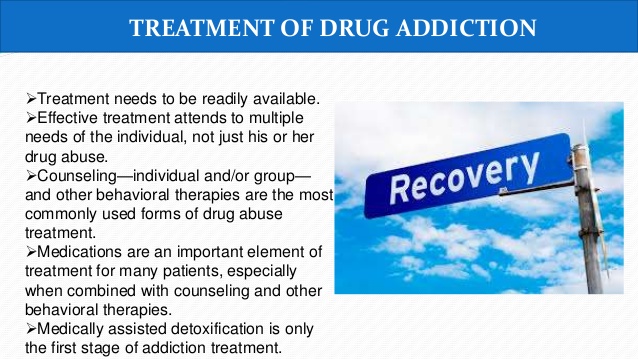Although there's no treatment for drug addiction, treatment alternatives described below can help you overcome an addiction and remain drug-free. Your treatment depends upon the drug utilized and any related medical or mental health conditions you may have. Long-lasting follow-up is necessary to prevent relapse. Treatment programs generally use: Person, group or family therapy sessions A focus on comprehending the nature of addiction, becoming drug-free and preventing relapse Levels of care and settings that differ depending on your requirements, such as outpatient, residential and inpatient programs The goal of detoxification, also called "detox" or withdrawal therapy, is to allow you to stop taking the addictive drug as quickly and safely as possible.
Others might require admission to a healthcare facility or a residential treatment center. Withdrawal from different classifications of drugs such as depressants, stimulants or opioids produces various Addiction Treatment Facility side effects and needs various techniques. Detox may involve slowly lowering the dose of the drug or briefly substituting other compounds, such as methadone, buprenorphine, or a mix of buprenorphine and naloxone.
Naloxone briefly reverses the impacts of opioid drugs. While naloxone http://claytonbnav273.trexgame.net/some-known-questions-about-how-to-get-free-meth-addiction-treatment-for-homeless-man has actually been on the market for many years, delivery systems such as Narcan (a naloxone nasal spray) and Evzio (a naloxone injection device) are now offered, though they can be extremely costly. Evzio is a small injection device that offers voice guidelines to guide the user and instantly place the needle into the thigh to deliver the naloxone injection.
As part of a drug treatment program, behavior treatment a kind of psychiatric therapy can be done by a psychologist or psychiatrist, or you might get counseling from a licensed alcohol and drug therapist. Therapy and counseling may be finished with a specific, a household or a group. The therapist or counselor can: Help you establish methods to manage your drug yearnings Suggest strategies to avoid drugs and avoid relapse Offer ideas on how to handle a relapse if it occurs Talk about issues regarding your task, legal issues, and relationships with household and good friends Include member of the family to assist them establish much better communication skills and be helpful Address other psychological health conditions Numerous, though not all, self-help support system utilize the 12-step design first developed by Twelve step programs.
The self-help support system message is that dependency is a persistent disorder with a danger of relapse. Self-help assistance groups can decrease the sense of embarassment and seclusion that can cause regression. Your therapist or licensed counselor can assist you find a self-help assistance group. You might also find support system in your neighborhood or on the internet.

Some Of Important Facts People Who Are Seeking Treatment For Drug Addiction Should Know
Knowing brand-new coping skills and understanding where to find aid are necessary. Taking these actions can assist: Drug dependency is linked to a variety of issues that might be assisted with treatment or counseling, including other underlying psychological health issues or marital relationship or family issues. Seeing a psychiatrist, psychologist or licensed therapist may assist you regain your assurance and mend your relationships.
Look for immediate treatment from a qualified psychological health professional if you have any signs or symptoms of psychological health issue. Assistance groups, such as Narcotics Anonymous or Twelve step programs, can be very reliable in dealing with dependency. Empathy, comprehending and shared experiences can help you break your dependency and stay drug-free.
You can begin by discussing your substance use with your main medical professional, or ask for a recommendation to an expert in drug addiction, such as a certified alcohol and drug counselor, or a psychiatrist or psychologist. Take a relative or pal along (what addiction treatment programs take kaiser permanente). Here's some details to assist you prepare for your appointment.
To get an accurate concept of which treatment might help, be sincere with your physician or other psychological health specialist. that you're taking, and the dosages. Tell the physician about any legal or prohibited drugs you're using. your physician or mental health expert. Some concerns to ask your physician may consist of: What's the best technique to my drug dependency? Should I see a psychiatrist or other mental health specialist? Will I need to go to the hospital or spend time as an inpatient or outpatient at a recovery clinic? What are the alternatives to the primary approach that you're suggesting? Exist any brochures or other printed product that I can have? What sites do you recommend? Don't be reluctant to ask other questions during your visit.
Be prepared to address them to reserve time to go over any points you want to focus on. Your medical professional may ask: What drugs do you utilize? When did your substance abuse initially begin? How often do you use drugs? When you take a drug, how much do you use? Do you ever feel that you might have a problem with drugs? Have you tried to give up on your own? What occurred when you did? If you attempted to give up, did you have withdrawal symptoms? Have any household members criticized your substance abuse? Are you ready to get the treatment required for your drug dependency? Oct.

Not known Facts About How To Get More Clients At An Outpatient Addiction Treatment Program
Drugs and Alcohol Can Hijack Your BrainPeople with addiction lose control over their actions. They long for and look for drugs, alcohol, or other substances no matter what the costeven at the threat of damaging friendships, injuring family, or losing jobs. What is it about dependency that makes individuals act in such damaging methods? And why is it so hard to give up? NIH-funded researchers are working for more information about the biology of addiction.
But even for those who have actually successfully stop, there's constantly a risk of the addiction returning, which is called relapse. The biological basis of addiction assists to discuss why people need a lot more than great intents or self-discipline to break their addictions. "A typical misperception is that dependency is an option or moral problem, and all you have to do is stop (how could the family genogram be applied to the treatment of a family with addiction issues).
George Koob, director of NIH's National Institute on Alcohol Abuse and Alcohol Addiction. "The brain really changes with dependency, and it takes a great offer of work to get it back to its normal state. The more drugs or alcohol you've taken, the more disruptive it is to the brain." Researchers have discovered that much of dependency's power depends on its ability to hijack and even ruin essential brain regions that are suggested to help us endure.
It does this by switching on brain circuits that make you feel fantastic, which then inspires you to duplicate those behaviors. In contrast, when you remain in risk, a healthy brain presses your body to respond quickly with worry or alarm, so you'll leave damage's way. If you're tempted by something questionablelike eating ice cream prior to supper or buying things you can't affordthe front regions of your brain can help you decide if the consequences are worth the actions.
Drugs Mental Health Facility or alcohol can hijack the pleasure/reward circuits in your brain and hook you into desiring a growing number of. Dependency can likewise send your emotional danger-sensing circuits into overdrive, making you feel nervous and stressed when you're not using the drugs or alcohol. At this stage, individuals often utilize drugs or alcohol to keep from feeling bad instead of for their pleasurable results.